The Benefits of Pomegranate Juice: A Review
Pomegranate juice, derived from the fruit of the Punica granatum tree, has been consumed for thousands of years due to its unique taste and potential health benefits. In recent years, scientific research has focused on the impact of pomegranate juice on cardiovascular health, antioxidant activity, and other aspects of human well-being. This article summarizes the findings of several key studies on pomegranate juice and its effects on human health.
I. Pomegranate Juice and Carotid Artery Stenosis (CAS)
A study by Aviram et al. (2004) investigated the effects of consuming pomegranate juice for three years in patients with CAS. The results showed that long-term pomegranate juice consumption significantly reduced common carotid intima-media thickness, blood pressure, and LDL oxidation. These findings suggest that pomegranate juice may have protective effects against the progression of atherosclerosis in patients with CAS.
II. Antioxidant Activity and Phenolic Composition of Pomegranate Juice
A study by Gil et al. (2000) examined the antioxidant activity of pomegranate juice and its relationship with the phenolic composition and processing methods. The results showed that pomegranate juice exhibits high antioxidant activity due to its high content of phenolic compounds, particularly anthocyanins and ellagitannins. The study also found that processing methods, such as pasteurization and storage, can affect the antioxidant activity of pomegranate juice, with minimal changes observed when stored at 4°C for up to 6 months.
III. Pomegranate Juice and Oxidative Damage in Cardiovascular Diseases
A review by Aviram (2000) summarized the findings of human studies on oxidative damage and antioxidant protection related to cardiovascular diseases. The review highlighted the potential benefits of pomegranate juice in reducing oxidative stress and inflammation, both of which are key factors in the development and progression of cardiovascular diseases.
IV. Pomegranate Juice and Serum Angiotensin Converting Enzyme (ACE) Activity
A study by Aviram and Dornfeld (2001) investigated the effects of pomegranate juice consumption on serum ACE activity and systolic blood pressure. The results showed that pomegranate juice consumption significantly reduced both serum ACE activity and systolic blood pressure in the study participants. This suggests that pomegranate juice may have a beneficial effect on blood pressure regulation and cardiovascular health.
The scientific evidence reviewed in this article suggests that pomegranate juice has several potential health benefits, particularly in the context of cardiovascular health. Pomegranate juice consumption has been shown to reduce common carotid intima-media thickness, blood pressure, and LDL oxidation, as well as exhibiting high antioxidant activity and reducing serum ACE activity. These findings highlight the potential role of pomegranate juice as a natural and effective dietary intervention for the prevention and management of cardiovascular diseases.
References:
- Aviram, Michael, Mira Rosenblat, Diana Gaitini, Samy Nitecki, Aaron Hoffman, Leslie Dornfeld, Nina Volkova, et al. “Pomegranate Juice Consumption for 3 Years by Patients with Carotid Artery Stenosis Reduces Common Carotid Intima-Media Thickness, Blood Pressure and LDL Oxidation.” Clinical Nutrition 23, no. 3 (June 2004): 423-33. https://doi.org/10.1016/j.clnu.2003.10.002.
- Gil, M. I., F. A. Tomás-Barberán, B. Hess-Pierce, D. M. Holcroft, and A. A. Kader. “Antioxidant Activity of Pomegranate Juice and Its Relationship with Phenolic Composition and Processing.” Journal of Agricultural and Food Chemistry 48, no. 10 (October 2000): 4581-89. https://doi.org/10.1021/jf000404a.
- Aviram, Michael. “Review of Human Studies on Oxidative Damage and Antioxidant Protection Related to Cardiovascular Diseases.” Free Radical Research 33 Suppl (2000): S85-97. https://pubmed.ncbi.nlm.nih.gov/11191279/.
- Aviram, M., and L. Dornfeld. “Pomegranate Juice Consumption Inhibits Serum Angiotensin Converting Enzyme Activity and Reduces Systolic Blood Pressure.” Atherosclerosis 158, no. 1 (September 2001): 195-98. https://doi.org/10.1016/s0021-9150(01)00412-9.







